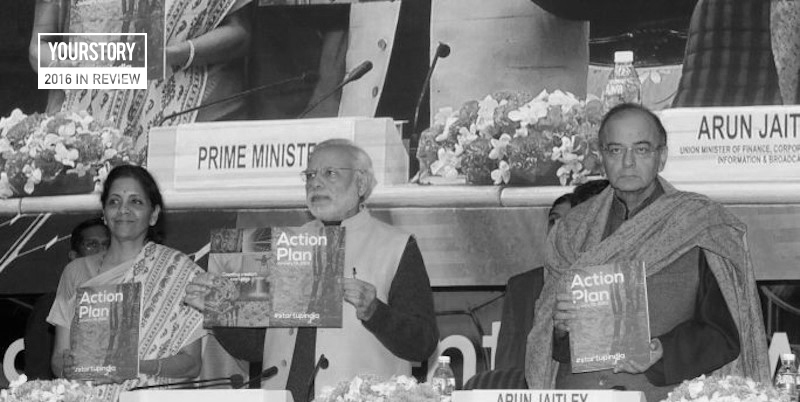The supposed beneficiaries of Startup India have been left in limbo. A lack of clarity in the programme’s procedures, as well as mundane restrictions, has led to a good deal of disillusionment.
Dr Harmitsingh Sikh, Founder and CEO of FoodMemories, applied for the SIDBI fund through the Entrepreneurship Development Institute of India (EDII) in May this year. His application has been screened thrice in Ahmedabad, and all three times, he has received the answer: ” ‘The forms are with the commissioner’s office.’ I get the same answer every time I call them.”

No one has the answer and this is happening across each state in the country. Unfortunately, Harmitsingh’s frustrating experience is matched by those of several other startup founders too. The Startup India policy is as bureaucratic as it gets because most startups that YourStory spoke to were in a similar predicament to that of Harmitsingh.
Nine months after the Startup Policy went live, there seems to be very little fruit in the tree that was supposed to usher in India’s startup revolution.
The Startup India Standup India was launched with much fanfare in January this year, with the Prime Minister releasing a startup policy to encourage entrepreneurship in India.
For a thorough understanding of the subject, one must sieve through 22 bureaucratic PDF notifications and notes to understand how Startup India works, and even after that, you cannot say for certain whether it really works at all. It is like a scene out of an Asterix comic book called the ‘12 Tasks of Asterix’, where the Roman bureaucracy asks Asterix to get a form signed and none of the bureaucrats know the signing authority. A startup would be well advised to hire a lawyer to get through these tedious rules and make it simpler for the founders to understand.
Empty measures?
In all, 23,000 queries regarding the policy were answered and 1,200 applications were received, of which only 428 had the relevant documentation.
The funny part is that only five startups have been approved under the policy for funding, after looking at 99 final applications in the early part of the year.
As on December 7, 2016, there were 497 startups recognised by the Startup India policy. Of this list, about 60 percent are healthcare, IT solutions, food processing, agritech, and biotechnology-related companies. There have been no criteria announced for the selection of these startups, and that is something that needs to be disclosed.
The only good thing is that foreign VCs can invest in 10 sectors without RBI approval, which includes sectors like infrastructure, IT, poultry tech, dairy products, and nanotechnology. However, the baffling thing is that infrastructure here is coming under the ambit of startups while it has always been a game for large conglomerates.
The Ministry of Electronics and Information Technology (MeitY), the Securities and Exchange Board of India (SEBI), and the Department of Industrial Policy and Promotion (DIPP) have made bureaucratic announcements and seem to have forgotten that very little action is happening on the ground.
Sources say that SIDBI has released Rs 1,400 crore of the Rs 2,000 crore earmarked to participate in the fund of funds by 2017. This money is to be disbursed to VCs and incubation centres. A list of 115 incubators has been put out by the DIPP, but how many of those have received money is anybody’s guess.
…

